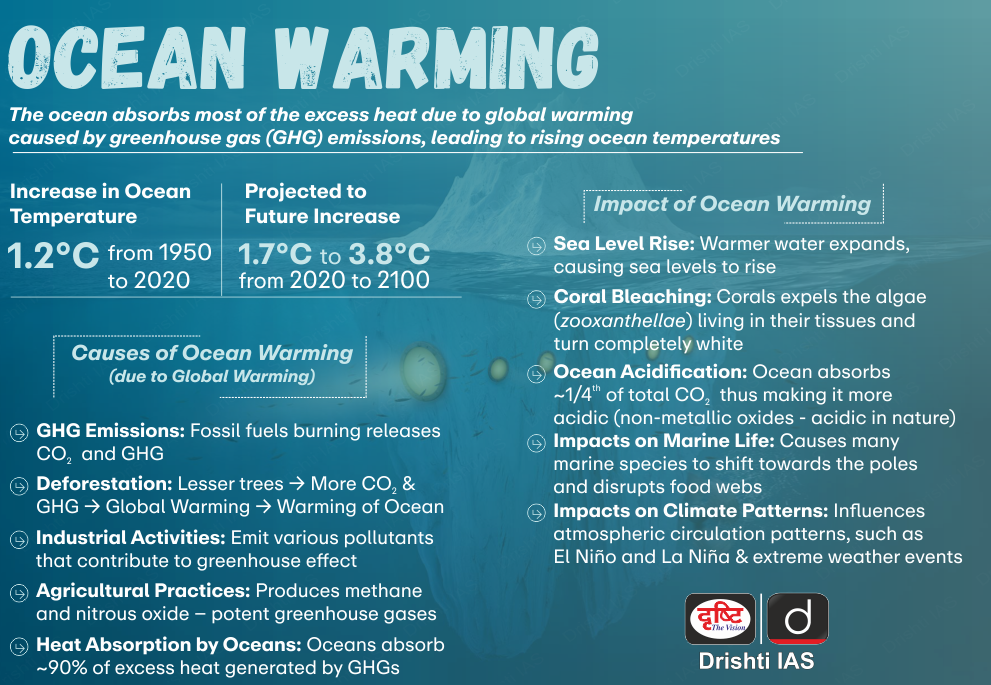Ocean Circulation and Climate Change | 30 Jul 2024
Why in News?
Recently, a study published in Nature Communications has gained attention for its unexpected findings about the ocean's role in climate change.
- The study reveals that a weaker ocean circulation might increase atmospheric CO2 levels, contrary to previous assumptions.
What is the Relation Between Climate Change and Ocean Circulation?
- The Role of Overturning Circulation: Ocean overturning circulation acts as a global conveyor belt, moving water and nutrients across the ocean. It is a two-fold process.
- As surface waters absorb CO2 and cool, they become denser and sink into the deep ocean, transporting carbon away from the atmosphere.
- Deep waters upwell, bring nutrients and carbon back to the surface, where they support marine life and help regulate atmospheric CO2 levels.
- Traditional Views on Ocean Circulation and Climate Change: As climate change progresses, scientists predict a weakening of ocean overturning circulation due to various factors.
- Melting Ice Sheets: Particularly around Antarctica, melting ice sheets add freshwater to the ocean, disrupting circulation patterns.
- Temperature Changes: Global warming affects ocean temperature gradients, further impacting circulation.
- The traditional view is that weaker circulation would mean less carbon is stored in the deep ocean, but the ocean's carbon sink effect would stay balanced due to less carbon coming back up.
- New Insights from Research: New research reveals a complex feedback mechanism involving ocean circulation, iron availability, microorganisms, and ligands, showing that weaker ocean circulation could increase atmospheric CO2 levels contrary to previous beliefs.
- Ligands are organic molecules that bind with iron to keep it soluble and accessible for phytoplankton growth, but their availability can limit the effectiveness of iron fertilization efforts globally.
- Implications for Climate Change Mitigation: The study highlights the need to reconsider the ocean’s role in climate change mitigation, as weaker ocean circulation could reduce carbon sink effectiveness, leading to higher atmospheric CO2 and exacerbating global warming.
What is Meridional Overturning Circulation (MOC)?
- Definition: The Meridional Overturning Circulation (MOC) is a crucial component of global ocean circulation, moving water, heat, salt, carbon, and nutrients primarily in the north-south direction within and between ocean basins. It plays a vital role in regulating the Earth's climate.
- Mechanism:
- Northward Flow: In the Atlantic Ocean, warm and salty surface water is transported from the South Atlantic towards the Nordic Seas (near Greenland, England, and Northern Canada). Here, it cools, becomes denser, and sinks to form deep water currents that flow southwards towards Antarctica.
- Antarctic Contribution: Near Antarctica, even denser waters are formed. These waters flow north along the seafloor into the North Atlantic, where they rise and mix with other waters before flowing back to the south.
- Significance:
- The MOC is responsible for about two-thirds of the oceanic northward heat transport, making it essential for climate regulation.
- Changes in the MOC influence regional and global heat distribution, affecting climate and weather patterns.
- Cycle Duration: The entire circulation cycle of the MOC, also known as the oceanic conveyor belt, is extremely slow. It takes approximately 1,000 years for a parcel (any given cubic meter) of water to complete its journey along the belt.
UPSC Civil Services Examination, Previous Year Question (PYQ)
Prelims:
Q. At the national level, which ministry is the nodal agency to ensure effective implementation of the Scheduled Tribes and Other Traditional Forest Dwellers (Recognition of Forest Rights) Act,2006? (2021)
(a) Ministry of Environment, Forest and Climate Change
(b) Ministry of Panchayati Raj
(c) Ministry of Rural Development
(d) Ministry of Tribal Affairs
Ans: (d)
Q. Stiglitz Commission established by the President of the United Nations General Assembly was in the international news. The commission was supposed to deal with (2010)
(a) The challenges posed by the impending global climate change and prepare a road map
(b) The workings of the global financial systems and to explore ways and means to secure a more sustainable global order
(c) Global terrorism and prepare a global action plan for the mitigation of terrorism
(d) Expansion of the United Nations Security Council in the present global scenario
Ans: (b)
Mains:
Q. Assess the impact of global warming on the coral life system with examples. (2019)


.png)